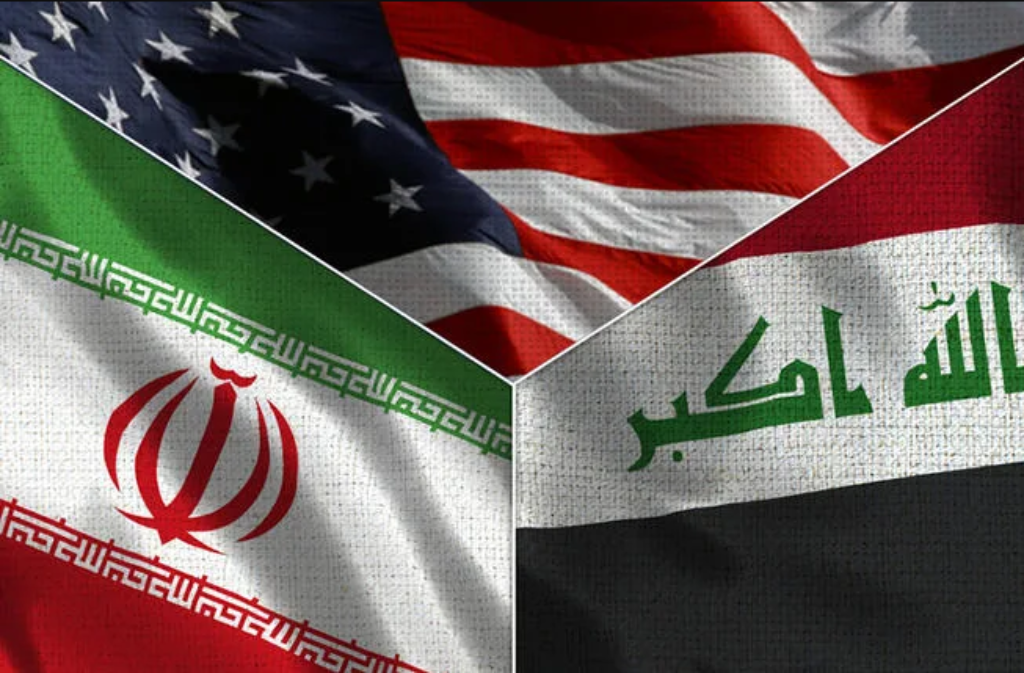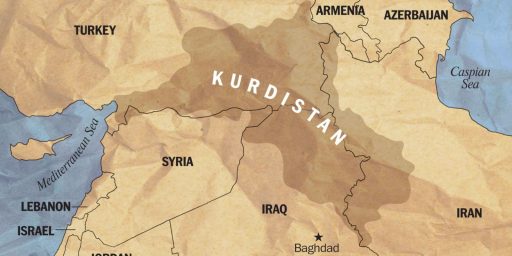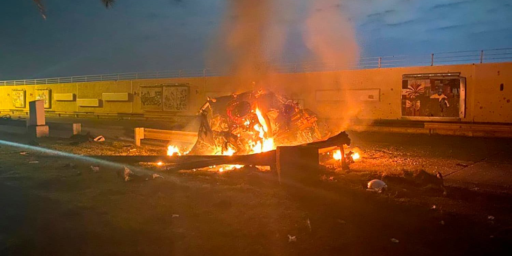In Attacking Iran, Trump Is Losing Iraq (Again)
The assassination of a top Iranian official on a visit to Baghdad is having the expected negative impact on our relationship with Iraq and the fight against ISIS.

As Iranians prepare to mark the death of Revoluntary Guard leader Maj. Gen. Qasem Soleimani via an American drone strike early Friday morning in Baghdad, Iraqis are also reacting negatively to an attack on a foreign official on their territory, placing America’s relationship with Baghdad in serious jeopardy. Today, that resulted in the passage of a non-binding resolution from Iraq’s Parliament calling for the removal of all foreign troops from Iraqi territory:
Iraq’s prime minister urged parliament on Sunday to take “urgent measures” to force the withdrawal of foreign forces following a U.S. drone strike that killed a senior Iranian commander and key Iraqi militia leader in Baghdad last week.
In an address to the legislature, Prime Minister Adel Abdul Mahdi recommended that the government establish a timetable for the departure of foreign troops, including the members of the U.S.-led coalition to fight the Islamic State, “for the sake of our national sovereignty.”
“What happened was a political assassination,” Abdul Mahdi said of the U.S. strike that targeted Iran’s elite Quds Force commander, Maj. Gen. Qasem Soleimani, as he traveled in a convoy near the Baghdad airport.
Lawmakers responded by passing a nonbinding resolution calling on the government to end the foreign troop presence in Iraq. The United States and Iraq cooperate under a strategic framework agreement whose cancellation requires binding legislation. Iraq’s caretaker government is not legally authorized to sign such a law, Iraqi legal experts said.
The vote Sunday did not immediately imperil the U.S. presence in Iraq, but highlighted the headwinds the Trump administration faces after the strikes, which were seen in Iraq as a violation of sovereignty and as a dangerous escalation by governments across the Middle East.
This vote comes at the same time that The New York Times reports that American forces in Iraq and Syria have halted their fight against ISIS and are now focusing on protecting themselves from attacks from pro-Iranian forces in the two countries:
The American-led coalition in Iraq and Syria halted its yearslong mission of attacking the Islamic State and training local forces in both countries Sunday as United States troops braced for retaliation from Iran after a strike that killed a powerful Iranian commander, military officials said.
In a statement, the American command said that after repeated attacks on Iraqi and American bases in past weeks, one of which killed an American contractor on Dec. 27, “we have therefore paused these activities, subject to continuous review.”
As noted, the vote by Iraq’s Parliament is non-binding, and it’s also worth noting that it took place even though a significant segment of the body, numbering more than 300 members, boycotted the session. This meant that those left behind to vote came largely from Shiite and other parts of Iraqi society dominated by forces sympathetic to Iran. Additionally, the current Iraqi Prime Minister is essentially acting in a caretaker position pending the naming of a relationship. Secretary of State Mike Pompeo pointed out both of these facts in appearances on the morning shows and at the same time dismissed concerns that the attack would have a negative impact on either the American fight against ISIS or our relationship with Iraq.
Notwithstanding the fact that the Parliamentary vote was non-binding and arguably does not reflect the opinion of the majority of Iraqi MPs, the very fact that it took place is another example of the extent to which Friday’s attack is causing even Iraqis who are opposed to Iranian influence in their country to reconsider Iraq’s relationship with the United States:
American oil workers were fleeing Iraq on Friday, as fears grew of war between the United States and Iran. At sermons in the Shiite holy city of Karbala, worshipers chanted, “Death to America!”
And in Tahrir Square in central Baghdad, where antigovernment protesters have gathered for months, a banner went up with a pointed message to both Iran and the United States: “Keep your conflicts away from Iraq.”
Iraqis awoke to the news on Friday that Maj. Gen. Qassim Suleimani of Iran, the architect of Iran’s dominating influence over Iraq, had been killed in an American drone strike near the Baghdad airport, along with several others.
Even before the shock of the brazen killing wore off, Iraqi factions were weighing their responses. Militias with ties to Iran vowed bloody revenge. The prime minister, Adel Abdul Mahdi, condemned the attack as “an outrageous breach to Iraqi sovereignty” and said Parliament would meet to discuss the future of the United States presence in Iraq.
Anti-government protesters, who have been protesting Iran’s stifling influence in the country, were worried their movement could be snuffed out by pro-Iran militias. And throughout the country, there was the familiar feeling that Iraq was a mere bystander in the broader geopolitical conflict between the United States and Iran taking place on Iraqi soil.
More broadly, the events raised a single, overarching question: can the United States maintain a cooperative security relationship with Iraq given the upheaval the assassination has provoked? The question was already coursing through the halls of power in Baghdad, even as the Trump administration said Friday that it was rushing new troops to the region in response to the crisis.
The airstrike on General Suleimani “was a clear breach of the terms of the American forces’ presence,” Mr. Abdul Mahdi said.
(…)
The United States has nearly 5,000 troops in Iraq on a handful of bases.
But whether they stay or go, the American power in Iraq was only likely to be diminished.“One sure result of the U.S. strike is that the era of U.S.-Iraq cooperation is over,” Richard N. Haass, the president of the Council on Foreign
Relations and a former American diplomat, wrote on Twitter. “The U.S. diplomatic & mil presence will end b/c Iraq asks us to depart or our presence is just a target or both. The result will be greater Iranian influence, terrorism and Iraqi infighting.”
More than 16 years after the American invasion of Iraq, a devastating conflict that cost close to $1 trillion and claimed about 5,000 American lives, Iran is the dominant power in Iraq, and its grip on Baghdad was on vivid display this week, even before General Suleimani’s killing.
When American airstrikes attacked the bases of a pro-Iranian militia on Sunday, killing at least 24 of its fighters, Iraqi officials spoke in one voice condemning the United States for violating Iraqi sovereignty, but few criticized the militia for carrying out the attack that killed an American contractor and precipitated the airstrikes.
When militia fighters marched on the American embassy on Tuesday to attack it, Iraqi security forces stepped aside to let them pass.
And as they lay siege to the embassy, setting fire to buildings and effectively blockading embassy personnel in the embassy overnight, Prime Minister Abdul Mahdi found that he was powerless to get them to leave.
(…)
Kenneth M. Pollack, a former C.I.A. official who is an expert on Iraq and Iran at the American Enterprise Institute, said the assassination means that, at least for a time, “Iraqi politicians will be less fearful of Iran and more willing to listen to the Americans.” The Iranians in Iraq, he said, having lost their leader, will be on their heels, trying to figure out what to do next.
But, he said, the United States seems to have no policy on Iraq beyond using the country as a base to confront Iran.
“I have been talking to my friends at State and there is no effort to use this to push Iraq in a better direction,” he said. He called the killing “a tactical move directed at Iran without a wider regional strategy.”
If it did get to the point where Iraq formally demanded the removal of American troops, it would have a significant impact on our ability to both monitor ISIS activity and to strike against their forces on the ground. Additionally, it would be another sign of something that has been happening from virtually the moment that the United States overthrew the government of Saddam Hussein. Rather than welcoming us as liberators and turning into the pluralistic and democratic society that the George W. Bush Administration would result from the Iraq War. Instead, what we left behind was a nation divided between Kurdish, Sunni, and Shiite forces and militias that exist largely outside the control of the government. Additionally, Saddam’s downfall has left Iran as the most dominant power in the region and effectively forced the struggling government in Baghdad to allow itself to become a client state of Tehran. This latest action is only likely to force the Iraqis even further into Iran’s arms.
If the Trump Administration had a plan and clear strategic goals headed into this, then perhaps things would have gone differently. For one thing, we would have been working with the Iraqis and with our European allies to lay the groundwork for what would obviously be seen as a significant escalation of tensions in the region. Instead, it appears that the President was motivated largely by negative coverage of his previous decision to call off a planned attack on Iranian forces in response to threats against Persian Gulf shipping and, without consulting anyone outside the White House or any nation in the region, chose the most extreme option. We’re only now starting to see the consequences of that action.






The lines on the ME map, left by the British and French mandates, never made any sense, particularly Syria and Iraq, which only stayed together due to strongmen. Now they are finally obliterated and the struggle is on to shape the future map. Overlying this Iranian efforts to have a greater Shia federation and Turkey’s desire to reconstitute a semblance of the Ottoman Empire.
America has no plan because none of the potential goals is worth what it would cost to achieve. Pompeo has been reduced to bleating that all America wants is for Iran to ‘act like a normal nation’. Quite apart from being meaningless gibberish, how would it benefit the US if Iran stopped its support for militias in Syria and Iraq? If it stopped supporting Lebanese Hezbollah, and the Houthis in Yemen? The beneficiaries would be Israel and the Gulf States. This would no doubt help the Trump Organization and Trump’s chances of re-election, but it wouldn’t do the United States any good.
The basic position of the USA for some years now has been that the invasion of Iraq was a terrible mistake, ditto the interference in Libya and the endless occupation of Afghanistan, but anyone living in the region who dares to resist these acts of aggression is a ‘terrorist’ who needs to be hunted down and killed. It’s a completely irrational, untenable position but nobody on either side of politics seems courageous enough to end it.
My bigger fear is that this pushes us to try to stay a lot longer. As long as we say there we will have Iraq groups attacking us. The claim is that Iran backed militias have killed hundreds of Americans. What that means is that Iraqi citizens weapons or training from Iran, but it is still Iraq citizens attacking us. Since we won’t want to be seen as running away, we will stay and have attacks on our people, just like we have in Afghanistan, and for what purpose? Syria, Russia, Iran and the Kurds have been responsible for defeating ISIS. It looks to me like we are back to trying to make Iraq into Sweden, but this time with right wing politics no doubt.
Steve
@steve:
As someone commented, perhaps here, this will end up costing us three M4As.
Quoting Pollack without mentioning his advocacy for the Iraq War is IMHO a crime.
@Ken_L:
“The basic position of the USA for some years now has been that the invasion of Iraq was a terrible mistake, ditto the interference in Libya and the endless occupation of Afghanistan, but anyone living in the region who dares to resist these acts of aggression is a ‘terrorist’ who needs to be hunted down and killed.”
The real basic position is that all of the above are not ‘really’ mistakes, where our leadership should be held accountable, and our nation’s behavior should changes.